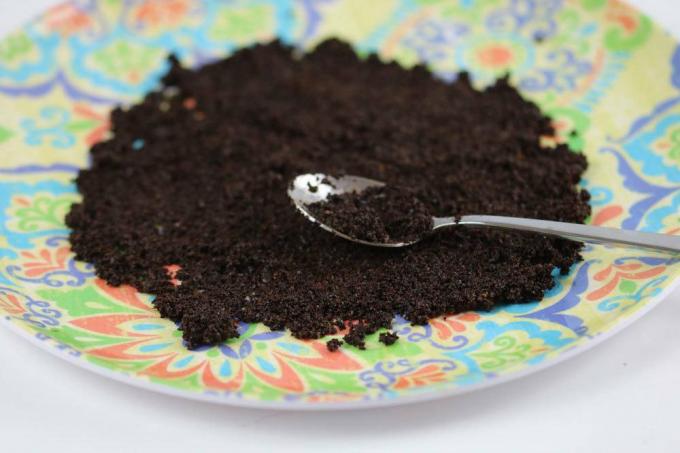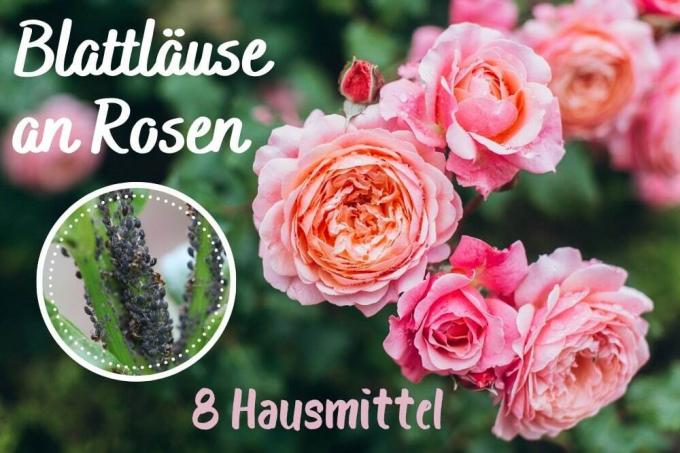
table of contents
- How to get rid of aphids on roses: 8 methods and home remedies
- shower
- Soapy water
- vinegar
- Nettle manure
- Manure from field horsetail
- Plant stock
- Potato water
- Black tea against aphids
Aphids are one of the most important rose pests that make gardeners despondent. The lice can appear in large groups, which is very bad for the plants. Suitable methods and home remedies help against the infestation.
How to get rid of aphids on roses: 8 methods and home remedies
If your rose bushes are weakened, they are helplessly exposed to aphids. In combination with persistent drought and warmth, a real plague of aphids can quickly occur, especially in spring, from which the roses are not immune. Once you see the classic signs of an infestation such as lice, honeydew or stunted leaves, you need to act as quickly and effectively as possible. If there is a severe infestation, you should remove the parts of the plant that are particularly badly infested before using home remedies. With these, the use of the methods listed below is usually no longer sufficient. If the infestation is not too intense, you can relax and use home remedies. The infestation usually takes place in the period from the end of March or the beginning of April to July and can limit the flowering accordingly.

Note: You should also do something about ants that are likely to have nested near or under the rose. The way of life of the individual colonies can weaken your specimens even more.
shower
One of the classic methods of quickly eliminating aphids on roses is to shower off the pests. Water ensures that the insects no longer have a hold and fall to the ground. At this point you can collect and dispose of the lice. With this method, it is important that you do not set the water jet too strong, otherwise the pink could be damaged. For this reason, it is advisable to use a water hose. You should never use a pressure washer for this method. Proceed as follows:
- Localize aphid infestation
- Point the beam directly at insects
- Do not ignore the underside of the leaves
An important point in this method is choosing the right time. Pick a day that allows the rose to dry again quickly, as excessive moisture can lead to a fungal attack. If your specimens are potted roses, you can also use water to fight the lice. To do this, cover the substrate and the bucket with cling film or something similar before inserting the garden hose. As with the bed roses, the plant must then be able to dry quickly. Since the aphid infestation recurs in many cases, you will have to resort to this method more often.

Soapy water
If showering the roses is not enough to drive the aphids away, you should use soapy water. Soapy water forms a film on the insects and ensures that they suffocate, effectively containing the infestation. In addition, the lye is a home remedy that will not harm the roses, as natural soaps are used. Are suitable:
- Curd soap
- Potash soap
- Neutral soap
- Soft soap
When purchasing a suitable soap, make sure that it does not contain any chemical ingredients. In this way you can be sure that the lye is not harmful to your specimens. Once you've decided on a soap, you can take action against the aphids:
- 50 grams of core, neutral or potash soap or 30 grams of soft soap
- Dissolve in 1 liter of water
- Water should be lukewarm
- fill in spray bottle
When mixing, you should keep a close eye on the structure of the lye. It should not be too thin, otherwise it will drip off the aphids too quickly, which has a negative effect on the film that should be deposited on the insects. If the solution has a watery consistency, add a little more soap to make it thicker. Then spray the lice with the lye and check daily whether the animals have died. In most cases, it is necessary to use the lye more often as the lice can be quite persistent. Once the remedy has worked, rinse the roses well. If you don't have a spray bottle, you can use a cloth to use the soapy water. Dip the cloth in the solution and treat any infected parts of the plant.

vinegar
In addition to the soapy water, another classic home remedy must not be forgotten to protect the roses from the aphids. Vinegar works to prevent and control aphids, so it can be used in a number of ways. If your rose bushes have become a victim of lice, you can use the vinegar solution as a spray to combat them effectively. You can also protect specimens that have not yet been infected if you use the product on them. Thanks to the acid in the vinegar, aphids cannot settle if the roses have already been treated with it. The home remedy is mixed according to the following recipe:
- 100 milliliters of vinegar essence
- 1 liter of water
You don't need more for the remedy, the 100 milliliters are completely sufficient to kill the aphids. When applying, it is important that all of the growth drip, otherwise the solution will not work. Wait a bit before doing another treatment so that the roses are not sprayed with vinegar too often. But don't let the lice out of your sight and spray again if necessary.
Attention: Never increase the concentration of the vinegar solution, otherwise the acid content would be too high on average, which could have a negative effect on the health of the rose. Use the dosage sparingly so that the plants are not weakened.
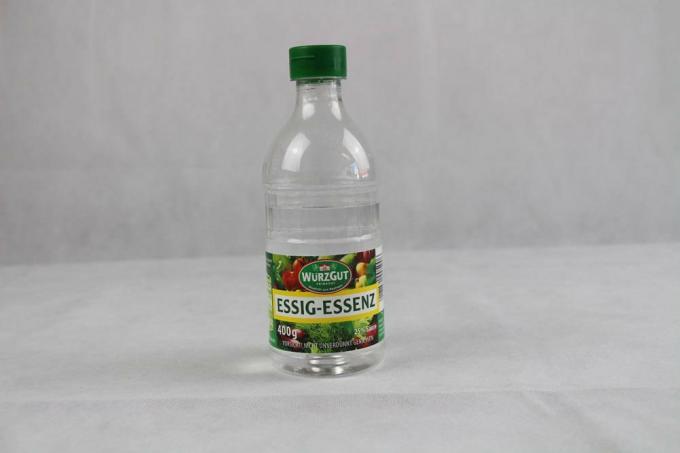
Nettle manure
Has proven to be an effective remedy against aphids on rose bushes Nettle manure proven. Even if it takes a few days to make, it is effective against the lice, even if the infestation is moderate. Aphids cannot withstand the fermentation substances in the manure and for this reason you should make use of them. You need:
- 1 kilogram of nettles (fresh)
- 10 liters of water
- large container (rain barrel)
The use of rainwater is recommended for the production of the liquid manure. The vessel used must also be made of plastic or wood to prevent damage. Metal vessels are completely unsuitable as they will be damaged by the manure. For this reason, rain barrels are most often used for production, as they offer the best conditions. Follow these instructions to make and use the manure:
- Put nettles in containers
- place in a warm place without direct sunlight
- fill up with water
- stir briefly
- to let go
- Brewing time: about two weeks
During the two-week waiting period, the liquid manure will ferment and in this way achieve the desired effect. Stir the mixture well every two days. Don't be surprised, the pungent smell is normal. If it is too strong for you, add some rock flour to the mixture to reduce the build-up of odor. The liquid manure should be ready after about two weeks. This can be recognized by whether the liquid manure is still forming bubbles. If all are gone, the manure is ready for use. Before use, it is mixed with water in a ratio of 1:10. Pour into a spray bottle, spray roses and repeat after two weeks if necessary.
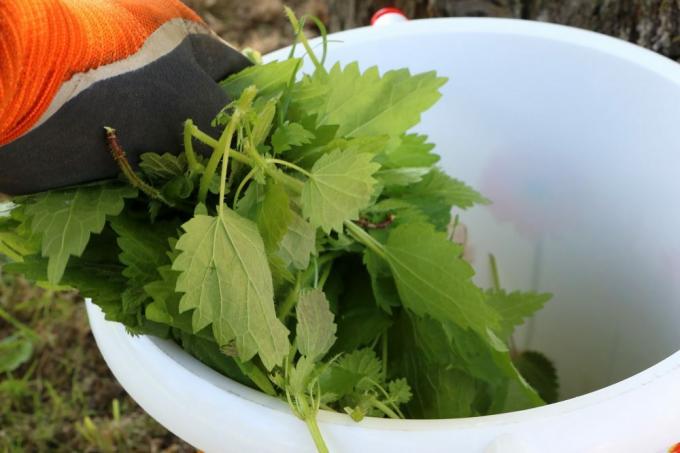
Manure from field horsetail
If you do not have any nettles available, you can prepare a manure made from field horsetail as an alternative. This has exactly the same effect on the lice as the nettle manure and is also produced in this way. The only difference is in the dosage:
- 1 kilogram horsetail (fresh)
- or 200 grams of horsetail (dried)
- 10 liters of water
Do not forget that the water should be cold so that the ingredients can be released over a long period of time. In order to only control the aphids with the liquid manure and not the roses, the liquid manure must be diluted. In contrast to the variant with nettles, dilute two liters of liquid manure with ten liters of water. You can then use the manure as a spray against the lice.
Tip: A faster variant of the liquid manure is the use of broths from tansy (Tanacetum vulgare), worm fern (Dryopteris) or bracken (Pteridium aquilinum), each with ten liters of rainwater for 24 hours will. Use 200 grams of dried leaves from the worm and bracken, while 300 grams of the dried inflorescences are used for the broth of the tansy fern.
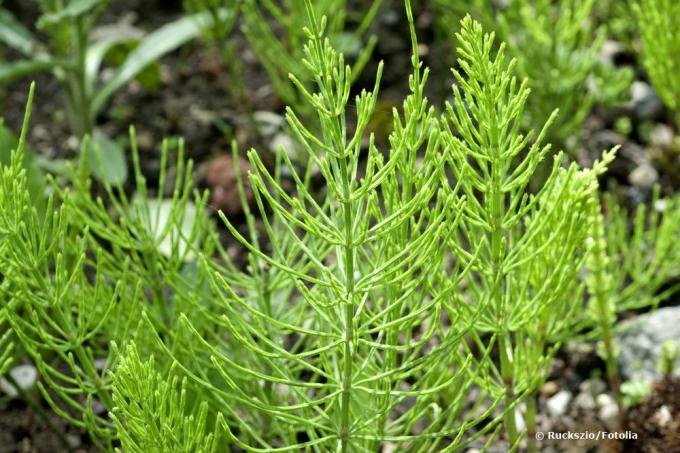
Plant stock
If you do not have time to make a liquid manure and the infestation is well advanced, you should switch to a plant stock. The broths have the advantage that they can be made from a wide variety of herbs and plants within a short time What makes them indispensable for your rose bushes in case the aphids for damage can be made care for. Compared to liquid manure, a brew is heated, which causes the liquid to be enriched with the active ingredients of the plants. In addition to being used as an insect repellent, they have other advantages if they are used regularly:
- improves the vitality of the rose bushes
- protects against diseases and other pests
- supplies the plant with nutrients
If you want to make use of a brew, different types are available to you. You must always observe the mixing ratio with water:
- Garlic: 80 to 100 grams in 10 liters of water
- Onions: 80 to 100 grams in 10 liters of water
- Savory: Handful from two liters of water
- Oregano: 100 grams (fresh) or 10 grams (dried)
While you are cooking the garlic, savory and onions in a double boiler, brew a means with oregano by pouring hot water over the herbs. Let the individual brews steep for 30 to 60 minutes before diluting them. Finally, you can spray the plants.
Tip: If you can't boil garlic stock, use the garlic cloves as a protection against aphids and their shepherds. Gently squeeze a few cloves of garlic and spread them around the roses as a barrier so that the ingredients help against the pests.
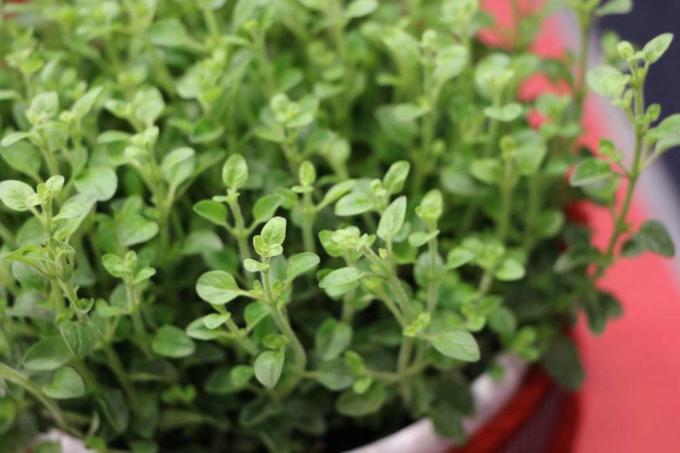
Potato water
One of the simplest and often the fastest available home remedies is potato water. Aphidoidea are sensitive to a large number of substances, one of which is the solanine contained in the nightshade family (Solanaceae). The insects do not tolerate solanine and depending on the amount used, they either die or flee. Thanks to the simple production process, large quantities of potato water are available, as it is a waste product when the delicious tubers are cooked. It is used in the following ways:
- Let the potato water cool down
- fill in spray bottle
- Apply directly to the aphids
- let it work
- apply several times at regular intervals as required
If you are dealing with a permanent infestation, potato water will establish itself as an effective and readily available remedy that you can use in a short period of time.
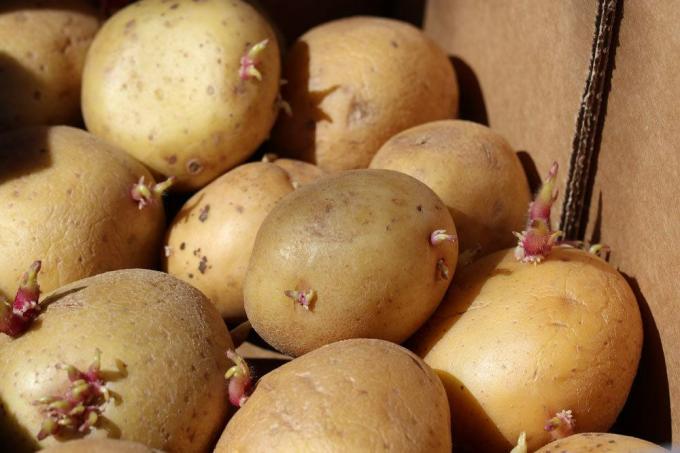
Black tea against aphids
Last but not least, black tea is a home remedy that you can use to combat the lice on your pink. The reason: caffeine. Caffeine is a powerful neurotoxin for numerous insects and black tea contains large amounts that have proven to be effective against the lice plague. You can take advantage of this by making a spray from the popular drink:
- put two tea bags in a pot
- Pour 500 ml of water (boiling) on top
- Brewing time: 15 min
- Remove the bag
- let cool down
When the tea has cooled down completely, it is poured into a spray bottle. Spray the lice and apply the treatment more often as necessary. If you don't have a spray bottle on hand, you can dip a cloth in the tea and rub off the infected leaves, leaf axes and shoots with it. As an alternative to black tea, you can use re-brewed coffee grounds as a remedy. Allow the coffee to cool and soak a cloth in the mixture that you can use to wipe the bugs off the leaves.
